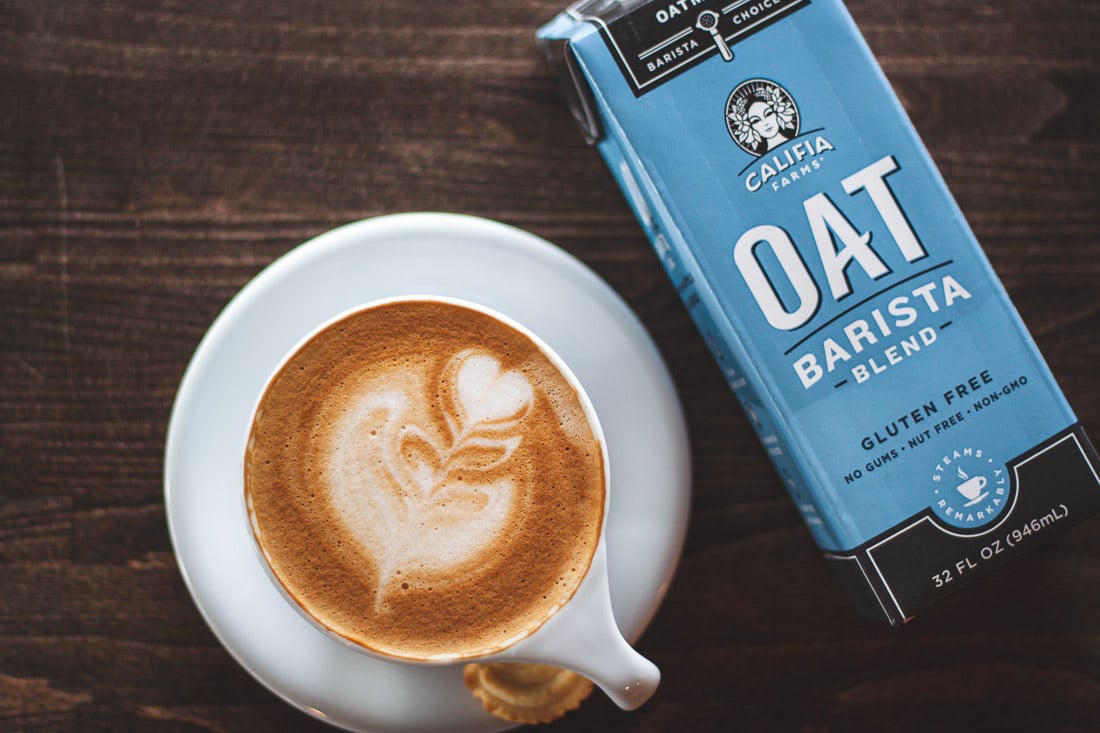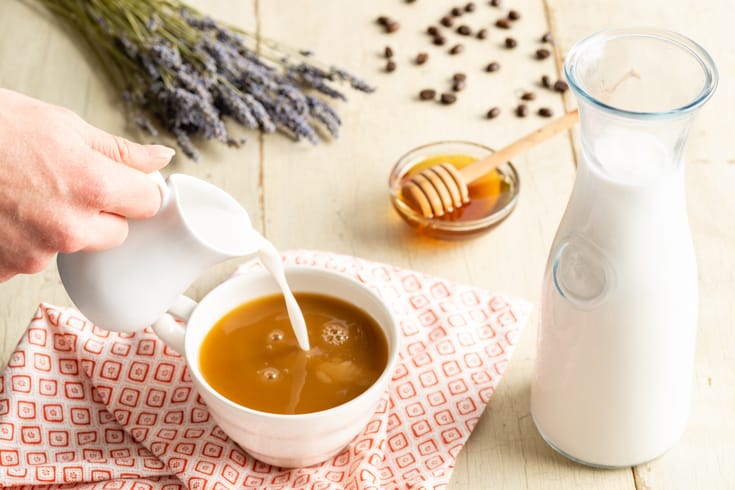

Introduction
When it comes to starting your day off on the right foot, a delicious cup of coffee can make all the difference. But have you ever considered the role that milk plays in enhancing your coffee experience? Choosing the best milk for your coffee can elevate the taste and texture of your favorite brew.
The importance of choosing the best milk for coffee
1. Creaminess and Texture: The right milk can add a creamy richness to your coffee, enhancing the overall taste and mouthfeel. Whole milk and cream are excellent choices for those seeking a luxurious and indulgent experience. If you prefer a lighter option, almond milk or oat milk can provide a creamy consistency without the added calories.
2. Foamability: If you enjoy a frothy cappuccino or a velvety latte, the type of milk you choose is crucial. Dairy options like whole milk and skim milk tend to froth well, creating a beautiful foam layer on top. Alternatively, barista-style non-dairy milk, such as soy or oat milk, can also produce excellent foam for latte art.
3. Taste: Different milk options have distinct flavors that can complement or change the taste of your coffee. For a traditional flavor, whole milk is a popular choice. Soy milk can add a nutty undertone, while almond milk and coconut milk provide a slightly sweet and unique taste. Experimenting with different milk options can help you find the perfect balance of flavors that suit your preferences.
Remember, the best milk for your coffee is subjective and depends on your personal taste preferences and dietary restrictions. So go ahead and explore the wide range of milk options available to find your perfect cup of coffee bliss!
Cow's Milk
Benefits and drawbacks of using cow's milk for coffee
Cow's milk is a popular choice for adding to coffee due to its creamy texture and mild taste. Here are some benefits and drawbacks to consider when using cow's milk in your coffee.
Benefits:
- Versatile: Cow's milk is readily available and can be easily found in most grocery stores.
- Creaminess: The natural fat content in cow's milk adds a creamy texture to coffee, enhancing the overall taste and mouthfeel.
- Nutrients: Cow's milk is a good source of essential nutrients like calcium, protein, and vitamin D.
Drawbacks:
- Lactose intolerance: Some people are lactose intolerant and may experience digestive issues when consuming cow's milk.
- Allergies: Cow's milk allergy is a common food allergy, causing symptoms like hives, swelling, and difficulty breathing in some individuals.
- Dietary restrictions: Cow's milk is not suitable for those following a vegan or dairy-free diet.
Different types of cow's milk for coffee
There are several types of cow's milk available that can be used in coffee, each with its own characteristics and flavor profiles.
- Whole milk: With a higher fat content, whole milk provides a rich and creamy taste.
- 2% milk: This milk has reduced fat content but still offers a creamy texture.
- Skim milk: Skim milk has had most of its fat removed, resulting in a lighter taste and texture.
- Plant-based alternatives: For those who cannot consume cow's milk, there are various plant-based options available, such as almond milk, soy milk, and oat milk.
Choosing the right type of cow's milk for your coffee depends on personal preference and dietary restrictions. Experimenting with different options can help you find the perfect balance of taste and texture for your morning cup of joe.

Almond Milk
Advantages and disadvantages of using almond milk for coffee
Using almond milk in your coffee can be a great alternative if you're looking to cut back on dairy or if you have lactose intolerance. Here are some advantages and disadvantages of using almond milk for your daily cup of java:
Advantages:
- Low in calories: Almond milk is lower in calories compared to regular milk, making it a healthier choice.
- Nutty flavor: Almond milk adds a subtle, nutty flavor to your coffee, enhancing the taste.
- Dairy-free: Almond milk is completely free from dairy, making it suitable for those with lactose intolerance or dairy allergies.
- Plant-based: Almond milk is made from almonds and water, making it a great choice for vegans or those following a plant-based diet.
Disadvantages:
- Thinner consistency: Almond milk has a thinner consistency compared to regular milk, which might not give you the same creamy texture in your coffee.
- Nut allergies: If you have a nut allergy, almond milk is not a suitable option for you.
- Separation: Almond milk can sometimes separate when added to hot coffee, so it may require stirring or shaking to prevent this.
Best brands of almond milk for coffee
Here are some popular brands of almond milk that are specifically formulated for enhancing the taste of coffee:
-
Califia Farms Barista Blend Almond Milk: Recommended by many baristas, this almond milk is known for its creamy texture and ability to froth well.
-
Silk Almond Milk: Silk offers a variety of almond milk options, including unsweetened and vanilla flavors, which can add some extra sweetness to your coffee.
-
Almond Breeze Original Almond Milk: This brand is widely available and offers a smooth and creamy almond milk that blends well with coffee.
Remember, the best brand for your coffee depends on your personal preference, so don't be afraid to experiment and find the one that suits your taste buds the best!

Introduction
If you're a coffee lover, you know that finding the perfect milk to complement your brew can make all the difference. One popular choice that has gained popularity in recent years is oat milk. Not only is it a great alternative for those with lactose intolerances or dietary restrictions, but it also adds a unique flavor and texture to your coffee. Here's what you need to know about using oat milk for your daily cup of joe.
Pros and cons of using oat milk for coffee
Pros:
-
Creamy texture: Oat milk has a rich and velvety texture that can enhance the overall mouthfeel of your coffee.
-
Mild flavor: Unlike some plant-based milk alternatives, oat milk has a subtler flavor that doesn't overpower the taste of your coffee. It blends well and allows the coffee's natural notes to shine through.
-
Foamability: Oat milk froths easily, making it a great option for creating latte art or adding a creamy finish to your cappuccinos.
Cons:
-
Thinner consistency: Compared to dairy milk, oat milk is generally thinner, which may not be preferred by those who enjoy a thicker and creamier cup of coffee.
-
Nutritional differences: While oat milk is generally a healthier alternative to dairy milk, it may have a higher calorie content and lower protein content compared to some plant-based milk alternatives.
Recommended oat milk options for coffee
Here are a few popular oat milk brands that are known for their quality and taste:
-
Oatly: Known for its creamy texture and neutral flavor, Oatly is a top choice for coffee enthusiasts.
-
Califia Farms: Califia Farms offers a range of oat milk flavors, including unsweetened, vanilla, and barista blend, which is specifically formulated for coffee.
-
Minor Figures: Minor Figures oat milk is loved by baristas and coffee lovers for its creamy consistency and excellent frothability.
Remember, the best oat milk for your coffee ultimately depends on your personal taste preferences. So, feel free to experiment and find the one that complements your coffee the best. Happy brewing!

Soy Milk
Benefits and drawbacks of using soy milk for coffee
If you're looking for a dairy-free milk alternative for your coffee, soy milk is a fantastic option. Here are some benefits and drawbacks to consider when using soy milk in your daily cup of joe.
Benefits:
-
Nutritional value: Soy milk is a great source of essential nutrients like protein, fiber, and various vitamins and minerals. It can be an excellent addition to your diet, especially for those following a plant-based lifestyle.
-
Creaminess: Soy milk has a creamy texture that can enhance the taste and mouthfeel of your coffee. It can provide a similar consistency to dairy milk and create a well-balanced and enjoyable cup of coffee.
-
Foamability: Soy milk can be frothed to create silky and smooth microfoam, making it an excellent choice for those who love milk-based espresso beverages like lattes and cappuccinos.
Drawbacks:
-
Flavor: Soy milk has its unique flavor that can be slightly nutty or bean-like. While many people enjoy this taste, others may find it overpowering in their coffee.
-
Curdling: Due to its slightly acidic nature, soy milk has the potential to curdle when combined with certain acidic coffee varieties or temperatures. It's essential to be mindful of this and adjust your brewing technique accordingly.
Top soy milk brands for coffee
When choosing a soy milk brand for your coffee, consider these reliable options that are known for their quality and taste:
- Silk Soy Milk
- Alpro Soy Milk
- Pacific Foods Organic Soy Milk
- EdenSoy Organic Soy Milk
These brands offer different varieties, including unsweetened, vanilla-flavored, and barista blends, catering to various preferences. Experiment with different brands to find the one that suits your taste preferences and complements your coffee perfectly. So go ahead, grab a carton of soy milk, and enjoy a delicious, dairy-free cup of coffee!

Coconut Milk
Advantages and disadvantages of using coconut milk for coffee
If you're looking for a delicious and creamy alternative to traditional milk in your coffee, look no further than coconut milk! Here are some advantages and disadvantages to consider:
Advantages:
- Tropical Flavor: Coconut milk adds a rich and tropical flavor to your coffee, giving it a unique and satisfying taste.
- Dairy-Free: For those with lactose intolerance or following a vegan lifestyle, coconut milk is a great dairy-free option.
- Healthy Fats: Coconut milk contains healthy fats that can provide a boost of energy and help keep you feeling full.
Disadvantages:
- Calorie Content: Coconut milk is higher in calories compared to other non-dairy milk alternatives, so it's important to be mindful of your overall calorie intake.
- Distinct Flavor: While some people love the taste of coconut, others may find it too overpowering in their coffee.
Popular coconut milk choices for coffee
When it comes to choosing the best coconut milk for your coffee, there are a few popular options to consider:
- Canned Coconut Milk: Canned coconut milk is thick and creamy, making it a great choice for those who enjoy a rich and velvety cup of coffee.
- Carton Coconut Milk: If you prefer a lighter consistency, carton coconut milk is a good option. It still provides the creamy texture without being too heavy.
- Coconut Creamer: For a convenient and ready-to-use option, coconut creamer is a popular choice. It usually comes in liquid form and can be easily added to your coffee.
In conclusion, coconut milk is a fantastic alternative for coffee lovers who enjoy a tropical twist. It offers unique flavors, is dairy-free, and provides healthy fats. Just be mindful of the calorie content and the distinct flavor. Try different options to find the best coconut milk that suits your taste preferences!

Other Milk Alternatives
Exploring other milk alternatives for coffee
Are you tired of the same old milk in your coffee? Looking to add some excitement to your morning routine? Well, you're in luck because there are plenty of delicious milk alternatives that can take your coffee to the next level!
One great option to consider is rice milk. Made from milled rice and water, it has a subtle and slightly sweet flavor that pairs perfectly with coffee. Rice milk is also known for its smooth texture, which creates a creamy and satisfying mouthfeel in your cup of joe.
Another popular choice is hemp milk. Made from the seeds of the hemp plant, it offers a nutty and earthy taste that can bring a unique twist to your coffee. Hemp milk is also packed with essential nutrients like omega-3 fatty acids, making it a healthy and flavorful choice.
For those seeking a dairy-free option, almond milk is a fantastic choice. Made from ground almonds and water, it has a creamy consistency and a slightly nutty flavor that complements coffee perfectly. Almond milk is also low in calories and contains no cholesterol, making it a healthy and guilt-free option.
Remember, experimenting with different milk alternatives is all about finding the perfect match for your taste buds. So why not give rice milk, hemp milk, or almond milk a try? You may discover a new favorite that will make your coffee experience even more enjoyable!

Choosing the Best Milk for Your Coffee
Considerations and factors to keep in mind when making your decision
When it comes to enjoying that perfect cup of coffee, the type of milk you choose can make all the difference. Whether you prefer a creamy latte or a frothy cappuccino, selecting the right milk is essential. Here are a few things to consider when making your decision.
1. Consistency: If you love a rich and creamy texture in your coffee, whole milk or full-fat milk is a great option. It adds a velvety smoothness that pairs perfectly with espresso.
2. Dietary restrictions: For those with dietary restrictions or lactose intolerance, there are plenty of non-dairy alternatives available. Almond milk, soy milk, or oat milk can be great options that still provide a creamy taste.
3. Foamability: If you enjoy a foamy layer on top of your coffee, consider using milk with a higher protein content. This includes dairy options like whole milk or 2% milk, as well as non-dairy options such as oat milk or soy milk.
4. Taste: Ultimately, the taste of your coffee is subjective and depends on your personal preference. Experiment with different milk options to find the one that complements the flavor profile of your coffee the best.
Remember to consider your specific needs and preferences when selecting the milk for your coffee. Whether you choose dairy or non-dairy, the right milk can take your coffee experience to the next level. So sit back, sip, and enjoy your perfectly brewed cup of joe!

Recipes and Tips
Delicious milk-based coffee recipes and tips to enhance your coffee experience
Are you a coffee lover looking to elevate your coffee experience with the perfect milk? Look no further! Here are some delicious milk-based coffee recipes and helpful tips to ensure you enjoy the best cup of joe every time.
Choose the Right Milk
When it comes to coffee, the choice of milk can make all the difference. Here are three popular options to consider:
-
Dairy Milk: If you prefer a classic and creamy taste, dairy milk is a great choice. Whole milk adds richness, while skim milk offers a lighter texture.
-
Almond Milk: For a dairy-free alternative that still provides a creamy texture, almond milk is a popular choice. It has a slightly nutty flavor that complements coffee well.
-
Oat Milk: Oat milk has gained popularity for its creamy consistency and mild flavor. It adds a subtle sweetness to your coffee, making it an excellent choice for those who enjoy a milder taste.
Try these Delicious Recipes
-
Vanilla Latte: Mix a shot of espresso with your choice of milk and add a dash of vanilla syrup. Top it off with some frothed milk and sprinkle of cinnamon for a delightful treat.
-
Mocha: Combine a shot of espresso, cocoa powder, and your desired amount of sweetener. Heat your milk and blend it into the mixture. Finish with whipped cream and a dusting of cocoa powder.
-
Caramel Macchiato: Start with a shot of espresso. Add steamed milk and caramel syrup. Finish by drizzling caramel sauce on top.
Remember, experimenting with different milk types and flavors can bring out unique and exciting flavors in your coffee. So go ahead and try out these recipes and tips to enhance your coffee experience and savor every sip of your perfectly brewed cup of joe. Cheers!

Conclusion
Summing up the findings and recommendations for the best milk for coffee
Congratulations on your journey to finding the perfect milk for your coffee! Remember, taste is subjective, and what works for one person may not work for another. However, after considering various factors, here are the top recommendations for the best milk to enhance your coffee experience:
-
Oat Milk: Oat milk is loved by many for its creamy texture and slightly sweet, nutty flavor. It froths well, making it a great choice for cappuccinos and lattes.
-
Almond Milk: Almond milk is a popular dairy-free alternative with a mild and slightly nutty taste. It pairs well with most coffee blends and is available in both sweetened and unsweetened varieties.
-
Coconut Milk: If you enjoy a tropical twist in your coffee, coconut milk is a great option. It adds richness and a subtle coconut flavor to your brew.
-
Soy Milk: Soy milk is a classic choice for coffee lovers. It has a creamy texture and blends well with the taste of coffee. Opt for unsweetened varieties to avoid altering the flavor of your drink.
Remember to experiment and find the milk that suits your personal taste preferences. Whether you prefer non-dairy options or traditional cow's milk, there are plenty of choices available to enhance your daily coffee ritual. So go ahead, grab your favorite mug, and indulge in a delicious cup of coffee with the perfect milk of your choice!



